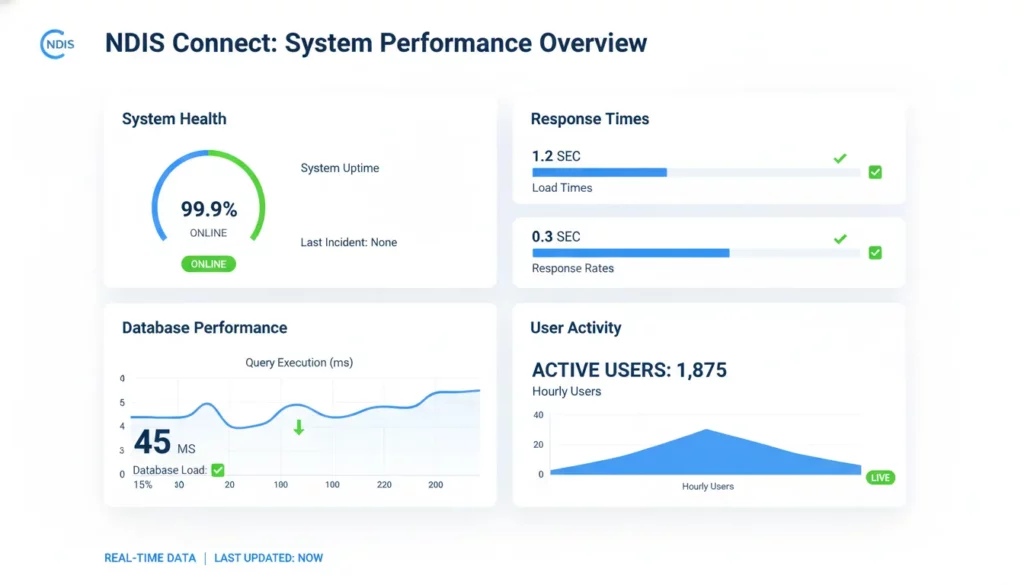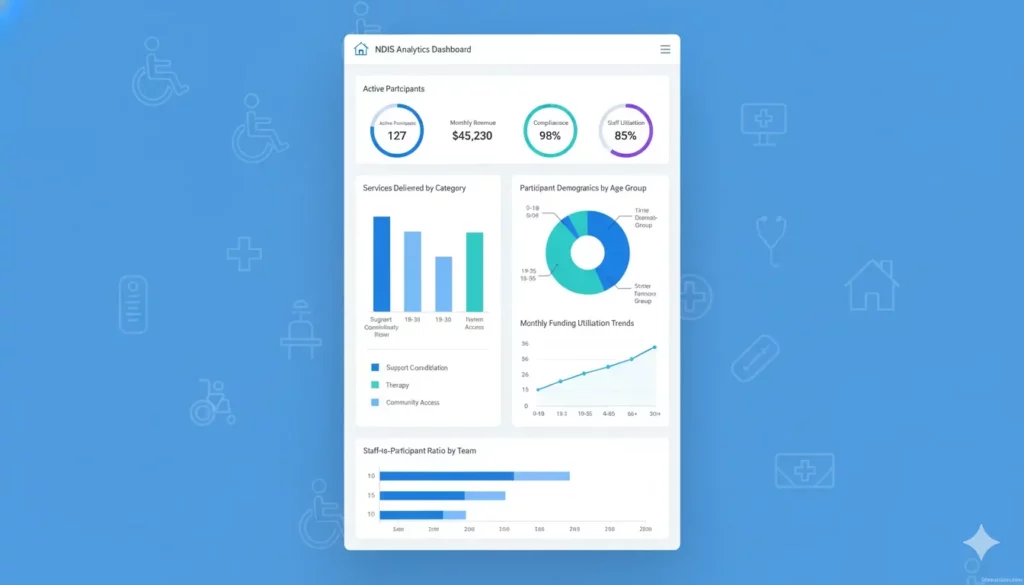NDIS Software Performance Optimisation: Speed and Efficiency
TL; DR NDIS software performance directly affects staff productivity, compliance accuracy, and participant outcomes. Slow systems increase administrative burden, disrupt service delivery, and heighten compliance risk. This guide explains how NDIS providers can improve NDIS system performance through measurable performance metrics, targeted optimisation strategies, infrastructure improvements, and proactive monitoring. It also highlights how Vertex360 is architected to deliver reliable speed, scalability, and operational efficiency for growing NDIS providers. Why NDIS Software Performance Matters Optimised NDIS software performance has become a core operational requirement for disability service providers working within a highly regulated and fast evolving environment. As participant numbers continue to rise and administrative obligations increase, system speed and reliability play a direct role in maintaining consistent service delivery and organisational stability. When NDIS systems are slow or unresponsive, staff productivity declines, participant interactions are delayed, and the likelihood of documentation errors increases. These inefficiencies accumulate over time, creating workflow friction that affects both frontline teams and management oversight. NDIS software speed optimisation should therefore be treated as a strategic enabler rather than a purely technical concern. Research from the Australian Productivity Commission shows that labour productivity declined by 0.17% in 2024-25, with technology optimisation becoming crucial for maintaining competitive advantage. For providers focused on sustainable growth, compliance confidence, and high quality participant outcomes, improving software efficiency in NDIS operations is essential. High performing systems empower staff to work effectively, support timely decision making, and ensure participants receive consistent, reliable services without disruption. Performance Metrics Understanding: Defining Key NDIS Software Performance Indicators Effective NDIS system performance optimisation starts with a clear understanding of how software performance is measured. Performance metrics provide objective visibility into whether systems are enabling efficient service delivery or creating operational friction across daily workflows. Load times are a critical indicator, measuring how quickly dashboards, participant records, invoices, and reports become accessible. Industry research shows that 53% of users abandon systems that take longer than three seconds to load. Even minor delays can disrupt staff momentum, particularly in high volume environments where systems are accessed repeatedly throughout the day. Response rates assess how rapidly the system reacts to user actions such as saving notes or generating claims. Slow responses increase staff frustration and the likelihood of repeated inputs, leading to data inconsistencies. System availability measures uptime reliability, ensuring essential NDIS functions remain accessible during core operating hours and peak usage periods. Together, these key performance indicators form the foundation of effective NDIS software performance optimisation, enabling providers to identify weaknesses, prioritise improvements, and maintain reliable system performance at scale. Common Performance Bottlenecks Affecting NDIS Software Many NDIS providers encounter NDIS software performance issues without clearly identifying their underlying causes. In most cases, these challenges stem from system and infrastructure limitations rather than staff capability or usage behaviour. Database overload is one of the most common bottlenecks, occurring when participant records, progress notes, invoices, and compliance documentation accumulate without effective indexing or data optimisation. As databases grow, poorly structured systems struggle to retrieve information efficiently, resulting in slow load times and delayed reporting. Network limitations also significantly impact NDIS system performance, particularly when providers rely on inconsistent internet connections or outdated internal infrastructure. According to software performance research, even 100ms delays can reduce system efficiency by up to 7%. In addition, user configuration issues, such as excessive access permissions or poorly designed workflows, increase system strain and reduce overall software efficiency in NDIS operations. These issues become particularly problematic for providers managing multiple locations or complex rostering arrangements. Identifying and addressing these performance bottlenecks is a critical first step before implementing any NDIS software performance optimisation strategy. NDIS Software Speed Optimisation Strategies Improving NDIS software speed optimisation does not always require replacing existing systems. Providers can achieve significant performance gains by taking targeted, actionable steps focused on configuration, workflow management, and usage practices. Reduce Data Duplication Audit participant records, progress notes, invoices, and compliance documents to identify and remove redundant entries. Streamline file storage and archive inactive records to improve query response times and reduce unnecessary system load, enhancing overall NDIS software performance. Modern systems should implement automated data deduplication processes to maintain efficiency. Standardise Workflows Train staff to follow consistent data entry procedures, avoid repetitive actions, and use system features efficiently. Well structured workflows minimise system strain, reduce errors, and increase operational accuracy, making everyday tasks faster and more reliable. Link workflows to your incident management processes for seamless operations. Apply Regular Software Updates Ensure all patches, performance enhancements, and security updates are installed promptly. NDIS Quality and Safeguards Commission requirements emphasise the importance of maintaining current software versions. Delaying updates can lead to slow response rates, system bottlenecks, and reduced software efficiency in NDIS operations, negatively affecting both staff productivity and participant outcomes. Implement Performance Monitoring Tools Use monitoring tools to track system load, identify slow modules, and adjust configurations proactively. Real time insights allow providers to address minor performance issues before they escalate, maintaining reliable system speed and operational efficiency. Integrate monitoring with your provider dashboard for comprehensive oversight. By following these actionable steps, NDIS providers can achieve measurable improvements in software speed, ensuring systems scale with organisational growth while enhancing staff productivity and participant service quality. Database Optimisation for NDIS Systems Database optimisation in NDIS software is a core driver of system speed and reliability. As participant data grows, inefficient database structures become increasingly problematic, particularly when managing complex service arrangements or multiple funding sources. Optimised databases use indexing, structured data relationships, and automated archiving to maintain fast access to active records. This prevents performance degradation as historical data accumulates over time. Modern databases should process queries within milliseconds rather than seconds, ensuring staff can access critical information instantly. Providers should ensure their platform is designed for high volume data processing without manual intervention. Modern NDIS platforms prioritise database optimisation as part of their core architecture, rather than treating it as a reactive fix. This includes intelligent caching, query optimisation, and automated background maintenance processes. Strong database design directly supports faster reporting, billing
NDIS Software Performance Optimisation: Speed and Efficiency Read More »










